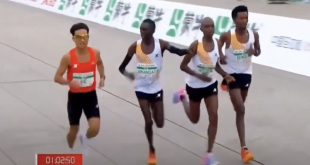
In the final installment of SBC’s match fixing series, David Kelly caught up with former FIFA Head of Security, and current Director of Sport Integrity at the International Centre for Sport Security, Chris Eaton, to discuss how the gambling industry can protect football integrity through international cooperation with police and sports bodies.
SBC:What is your opinion on revelations made in the New York Times and Sunday Times regarding match fixing and Qatar’s bid for the 2022 finals?
CE: Following the submission of the report in 2012, FIFA and the South African government were engaged in a public push and shove exchanges with each other for well over 12 months, with at one stage the SA Government declaring a judicial inquiry of the allegations, now subsequently withdrawn, while FIFA through its independent ethics investigator Michael Garcia, conducts another investigation of the alleged fixed “friendlies “. I understand that second FIFA investigation has not reported or concluded, but really 4 years on from the alleged fixes this is just far too long to resolve.
On the allegations concerning the Qatar 2022 bid, following the recommendations of the Mark Pieth Committee, FIFA now has an independent ethics investigation chamber led by Garcia, and he has been conducting an inquiry into the allegations. He is apparently reporting his findings in July to the Judicial Chamber, also independent. The responsible course is to wait for the independent investigation to report before commenting.
SBC: Is match-fixing more prevalent now or can we just detect it better?
CE: Match-fixing has grown in parallel with the growth of global on-line betting, especially live or in-play betting on all sports. By far the biggest gambling houses operate out of South East Asia, so while measuring the industry in Europe is interesting, it is nearly irrelevant next to the size of South East Asian-based gambling. The statistics widely vary, because much of the global betting market in South East Asia is either under-regulated and under-supervised, or not regulated at all. However over the last decade the amount of money gambled on-line has increased at least by 500%, and likely far more. It is the enormity and vulnerability of this money attracts criminals and organised crime.
SBC: You have extensive experience with Interpol, FIFA, and now the ICSS. What kind of approaches do they take to tackle match fixing?
INTERPOL and FIFA rely heavily on education and prevention through intelligence alerts. However they are not joined together either in investigation or information sharing due to INTERPOL’s Constitutional restrictions on sharing information with non-police bodies. Equally they are also not joined-up with the betting regulators that exist worldwide.
There are extensive global gaps in information and intelligence collection, and these become the safe-havens for matching fixers and betting fraudsters.
In the absence of official government-driven international responses, the ICSS with its self-mandated role to protect sport, not necessarily sport bodies, is moving into these gaps in a similar but more focused way to investigative journalists. We are finding out was has to be known to design the right, not merely simplistic solutions to protect sport for the future.
SBC: What can the betting industry do to protect sports integrity and counter the threat?
CE: The following take priority
1. There is no international sport betting regulation or supervision, and there is no international platform to join up those nations that actually do regulate sport betting. In effect sport-betting is a global market free-for-all;
2. International sport doesn’t care enough and does not find a unifying voice on match-fixing until it hurts image or income, and even then responses are usually calls for soft solutions, such as education and betting monitoring;
3. International sport betting just doesn’t give a damn. It is competitive, business driven and without either a social context or a social responsibility outside of what is forced on them by governments or through relatively feeble attempts to show they are doing something so as to deflect government attention from them. The sport betting industry will not responsibly self-regulate. Only governments have the power to do this;
4. Overall the international conspiracies of betting-fraud and match-fixing are perfect examples of how the global market place is vulnerable to criminal abuse and invulnerable to traditional police investigation methods and existing national government regulation;
5. There is a critical failure in credible, strong and committed international leadership within sport, governments and policing, sufficient to effectively mount a unified and concerted international challenge to transnational organised crime in both match-fixing and betting-fraud, and criminals are getting stronger as a result;
It is the responsibility of betting organisations and markets to create and maintain their own aggressive, dissuasive internal environment against criminal infiltration and corruption, and to cooperate with sport bodies and police by reporting suspicious betting patterns so that any corresponding behaviour in the field can be terminated during the match or that consequences can quickly follow the match. Betting businesses must be, and must be clearly seen to be, clean!
In short, too many key people fail to see this attack on the credibility of sport seriously enough. Saving sport from criminals and global greed must become one of the highest priorities of International leadership. Sport cannot be completely lost to greed and transnational criminality. If we lose sport to criminality and greed, what is left to unify and challenge the youth of the world?
SBC: In general, what can be done to address the issue, do you favour sanctions, education, or a multidisciplinary approach?
CE: Only a multidisciplinary approach will work. There is too much illegal and unregulated sport betting money vulnerable to organised crime attack, and both sport organisations and most sport betting organisations are too vulnerable to criminal corruption and infiltration. This is a complex and expanding global scandal, due primarily to government inaction, the blindfolds of national sovereignty and the fantasy of sport independence.
Only joining up in a truly global way the information and efforts of police, betting regulators, sport bodies and 3rd-party payment companies (who are the money interface for most internet betting transactions), will be an effective counter to organised crime corrupting sport and sport betting.
_____________________________
Chris Eaton, Director of Sport Integrity at the International Centre for Sport Security









